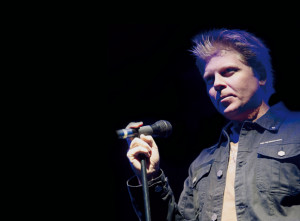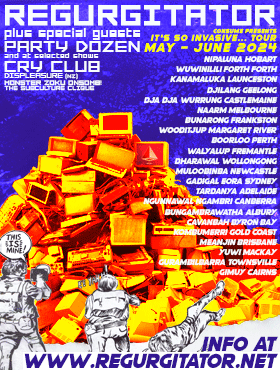THE OFFSPRING
June 12, 2008 | Author: Reza Nasseri
 It had been a while, but Southern Californian punk rock giants The Offspring returned to our shores to headline Soundwave 2008. Reza Nasseri had the pleasure of chatting with front-man Dexter Holland and bassist Greg Kriesel.
It had been a while, but Southern Californian punk rock giants The Offspring returned to our shores to headline Soundwave 2008. Reza Nasseri had the pleasure of chatting with front-man Dexter Holland and bassist Greg Kriesel.
You were inspired to start a band after attending a Social Distortion gig. What motivates you to continue making music after achieving such huge commercial success?
Dexter: When we started our band no punk band had made it. It was all Guns ‘n Roses and what not, and we were never into that. We never thought that we were going be big, and we were happy just doing what we were doing. I love being in a band, and out motivation comes from wanting to write the best songs we can over and over again.
Greg, tell me about your current touring bass rig. What does it consist of?
Greg: I use an Ampeg SVT 3 Pro head and matching 4 by 10 cabinets. Previously I was using Ibanez ATK basses, but have recently switched to the SR series. I don’t use much in the way of outboard gear, but use a Sans-Amp to add a bit of grit when I need it here and there. I go for a blend of a miked cabinet sound and a D.I. box in order to get a big, well-rounded tone too.
You guys have been endorsed by Ibanez for as long as I can remember. What Ibanez guitars are you playing at the moment Dexter?
D: We’ve been with Ibanez for over 10 years, and I’ve been playing their RG series of guitars for ever because they had the right sort of gain in order to play fast, aggressive muted riffs. I bought my RG’s before we were endorsed and I was totally stoked when Ibanez sponsored us. Since then I’ve basically asked them to modify what I had in order to suit what we needed for the road. My guitars come off stage covered in sweat and what not, so I don’t need micro-tuners, locking-nuts, or a Floyd-Rose getting in the way.
How did Noodles get his nickname?
D: Thom Wilson, our first producer came up with that. It refers to noodling on the guitar. He was like, “Noodles shut up” every five minutes when we were in the studio, and it just ended up sticking.
You guys pride yourselves on playing a good live show. How important is a good show in the overall scope of establishing yourselves as a band?
G: That was our main focus before Smash came out. The way in which we connected with our audience was through playing live shows because we didn’t have the internet back then, so we were forced to get out there, tour and play as many live shows as we could. We’ve always wanted to put on an energetic show so people would want come back and see us again
Obviously you guys are in a huge band and have a loyal fan base. Tell me about your craziest fan.
D: For the most part are fans are crazy and also very cool at the same time, and I like that energy. There was a girl in Japan that went to all our shows and spent so much time against the barricade that she followed us to the train station to show us all the bruises she’d accumulated on her arms. She was so proud of them, like they were war scars (laughs). She was a crazy fan, but the craziest would have to be this girl from Belgium that would send me perfumed Teddy Bears and love-letters in French, to my house in California every week. When we finally got to play a show in Belgium, there were flowers backstage with and address and no-one knew how they’d got there, so I got my tour manager to go and check this person out and put a stop to this. As it turns out, this girl was actually a sweet, old, grandmother that just really liked the band.
I had a quick listen to three tracks from your upcoming album and it seems like you guys are moving away from the energetic punk of “Smash” and towards a more mid-tempo rock sound. Dexter, you also seem to be addressing some pretty serious political issues this time around.
D: We wrote a little bit of political music on our first album, but our songs aren’t necessarily political, and these days it’s kind of dangerous to take that approach. There’s a new song called “Hammerhead” off our upcoming album, and it has a surprise ending. My goal it that song is to write about somebody going on a raid, it could be a soldier, or a narcotics cop etc., and how society says it’s okay to go out into the world and use deadly force, and at the very end of the song the same character ends up breaking into a classroom and shooting up the classroom. The idea of the song is to look at the comparison between governments telling you that it’s okay to kill in as opposed to the voices in your head.
G: I don’t know if political is the right term, I consider our music to be serious, but then again we’ve always written about serious stuff. Look at songs like “The Kid’s Aren’t Alright”, “Gone Away”, “Gotta Get Away” and “Self Esteem”, and even though that’s a fun song, it also addresses serious issues. Sometimes the interpretations to our songs are deliberately misleading, for example a lot of people don’t know that “Come Out And Play” was actually written about gang violence.
D: I guess we like to be serious and “take the piss” at the same time, that way it doesn’t sound like we’re preaching as much and it sits better with us and our audience too.
Finally, what is the grossest experience you’ve encountered as musicians?
G: Actually we were talking about this the other day. One of our roadies was paid to eat an ashtray once, cigarette butts and all. Then he threw it up and another guy came along and licked it (huge laughs). That was pretty gross.


